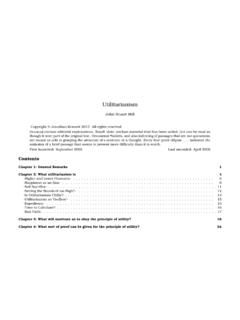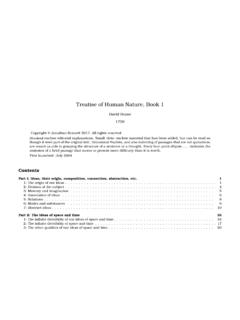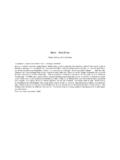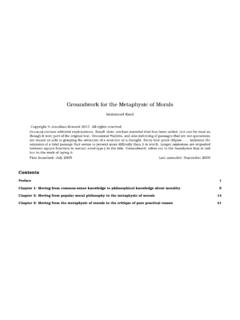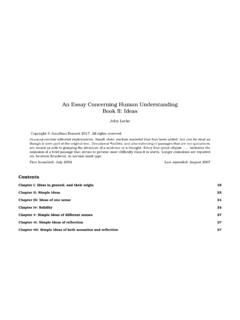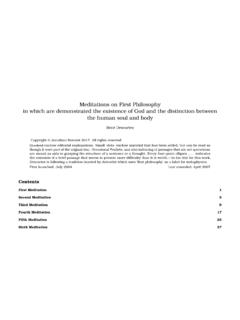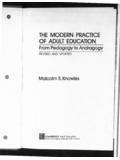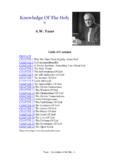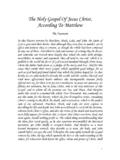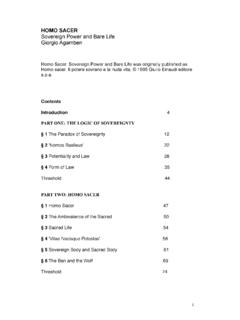Transcription of An Essay Concerning Human Understanding Book …
1 An Essay Concerning Human UnderstandingBook I: Innate NotionsJohn LockeCopyright Jonathan Bennett 2017. All rights reserved[Brackets]enclose editorial explanations. Small dots enclose material that has been added, but can be read asthough it were part of the original text. Occasional bullets, and also indenting of passages that are not quotations,are meant as aids to grasping the structure of a sentence or a thought. Every four-point ellipsis .. indicates theomission of a brief passage that seems to present more difficulty than it is worth. Longer omissions are reportedon, between [brackets], in normal-sized launched: July 2004 Last amended: August 2007 ContentsChapter i: Introduction1 Chapter ii: No innate speculative principles in the mind3 Chapter iii: No innate practical principles9 Chapter iv: Further points about innate principles, speculative and practical13 Essay IJohn Lockei: IntroductionChapter i: it isthe understandingthat sets man above all otheranimals and enables him to use and dominate them, it is cer-tainly worth our while to enquire into it.
2 The understandingis like the eye in this respect: it makes us see and perceive allother things but doesn t look in on itself. To stand back fromit and treat it as an object of study requires skill and hardwork Still, whatever difficulties there may be in doing this,whatever it is that keepsusso much in the dark toourselves,it will be worthwhile to let as much light as possible in uponour minds, and to learn as much as we can about our ownunderstandings. As well as being enjoyable, this will help usto think well about other purpose, therefore, is to enquire into the origin,certainty, and extent of Human knowledge, and also into the grounds and degrees of belief, opinion, and shan t involve myself with the biological aspects of themind.
3 For example, I shan t wrestle with the question ofwhat alterations of our bodies lead to our having sensationthrough our sense-organs or to our having any ideas inour understandings. Challenging and entertaining as thesequestions may be, I shall by-pass them because they aren trelevant to my project. All we need for my purposes is toconsider the Human ability tothink. My time will be wellspent if by this plain, factual method I can explain howour understandings come to have those notions of thingsthat we have, and can establish ways of measuring howcertainly we can know things, and of evaluating the groundswe have for our opinions.
4 Although our opinions are various,different, and often wholly contradictory, we express themwith great assurance and confidence. Someone observinghuman opinions from the outside seeing how they conflictwith one another, and yet how fondly they are embraced andhow stubbornly they are maintained might have reason tosuspect that either there isn t any such thing as truth orthat mankind isn t equipped to come to know it will be worth our while to find where the line fallsbetweenopinionandknowledge,and to learn more aboutthe opinion side of the line. What I want to know is this:When we are concerned with something about which we haveno certain knowledge, what rules or standards should guidehowconfident we allow ourselves to be that our opinionsare right?
5 Here is the method I shall follow in trying toanswer that question. First, I shall enquire into the origin ofthoseideasornotions call them what you will that a manobserves and is conscious of having in his mind. How doesthe Understanding come to be equipped with them? Secondly,I shall try to show whatknowledgethe Understanding has bymeans of those ideas how much of it there is, how secure itis, and how self-evident it is. I shall also enquire a littleinto the nature and grounds offaith or opinion that is,acceptance of something as true when we don t know forcertain that it is hope that this enquiry into the nature of the understand-ing will enable me to discover what its powers are howfar they reach, what things they are adequate to deal with,and where they fail us.
6 If I succeed, that may have theeffect of persuading the busy mind of man to be morecautious in meddling with things that are beyond its powersto understand; to stop when it is at the extreme end ofits tether; and to be peacefully reconciled to ignorance ofthings that turn out to be beyond the reach of our IJohn Lockei: IntroductionPerhaps then we shall stop pretending that we know every-thing, and shall be less bold in raising questions and gettinginto confusing disputes with others about things to whichour understandings are not suited things of which we can tform any clear or distinct perceptions in our minds, or, ashappens all too often, things of which we have no notions atall.
7 If we can find out what the scope of the understandingis, how far it is able to achievecertainty, and in what casesit can onlyjudgeandguess, that may teach us to accept ourlimitations and to rest content with knowing only what ourhuman condition enables us to , though the reach of our understandings falls farshort of the vast extent of things, we shall still have reasonto praise God for the kind and amount of knowledge that hehasbestowed on us, so far above all the rest of creation. Menhave reason to be well satisfied with what God has seen fitto give them, since he has given them everything they needfor the conveniences of life and the forming of virtuouscharacters that is, everything they need to discover howto thrive in this life and how to find their way to a betterone.
8 Men can find plenty of material for thought, and fora great variety of pleasurable physical activities, if they don tpresumptuously complain about their own constitution andthrow away the blessings their hands are filled with becausetheir hands are not big enough to grasp everything. Weshan t have much reason to complain of the narrowness ofour minds if we will only employ them on topics that may beof use to us; for onthosethey are very capable.. we know what our muscular strength is, weshall have a better idea of what physical tasks we canattempt with hopes of success. And when we have thoroughlysurveyed the powers of our own minds, and made someestimate of what we can expect from them, we shan t beinclined either to sit still, and not set our thoughts to work atall, in despair of knowing anything or to question everything,and make no claim toanyknowledge becausesomethingscan t be understood.
9 It is very useful for the sailor to knowhow long his line is, even though it is too short to fathom allthe depths of the ocean. It is good for him to know that it islong enough to reach the bottom at places where he needsto know where it is, and to caution him against runningaground.. was what first started me on thisEssay Concerningthe Understanding . I thought that the first step towards an-swering various questions that people are apt to raise aboutother things was to take a look at our own understandings,examine our own powers, and see to what they are fittedfor. Till that was done (I suspected) we were starting at thewrong end letting our thoughts range over the vast oceanof being, as though there were no limits to what we couldunderstand, thereby spoiling our chances of getting a quietand sure possession of truths that most concern us.
10 Ifmen consider the capacities of our understandings, discoverhow far our knowledge extends, and find the horizon thatmarks off the illuminated parts of things from the darkones, the things we can understand from the things wecan t, then perhaps they would be more willing to accepttheir admitted ignorance of the former, and devote theirthought and talk more profitably and satisfyingly to moving on, I must here at the outset ask youto excuse how frequently you will find me using the word idea in this book. It seems to be the best word to standforwhatever is the object of the Understanding when a manthinks; I have used it to express whatever is meant by phantasm , notion , species , or whatever it is that the mind2 Essay IJohn Lockeii: No innate speculative principlescan be employed about in thinking; and I couldn t avoidfrequently using it.


